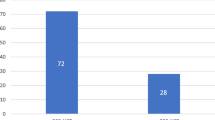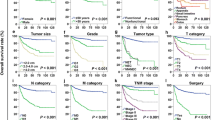Abstract
Background
Gastrointestinal neuroendocrine tumor (GI-NET) is a group of neoplasia consisting of amine and acid producing cells with different hormonal profiles. Although the entire GIS accounts for about 2% of tumors, recent research reveals that the incidence rate has increased. Given the increasing incidence in GI-NETs, more and more extensive research is needed on this subject. In this regard, the demographic and clinicopathological features of the patients diagnosed with GI-NET and their relationship with survival were investigated in the present study.
Methods
Thirty-four patients diagnosed with GI-NETs between January 2009 and December 2019 at the Department of Gastroenterology, Inonu University Faculty of Medicine were analyzed retrospectively. Gender, age, tumor localization, metastasis status, tumor number, tumor diameter, tumor grade, Ki-67 index, and the relationships of these factors with overall survival were examined.
Results
Of the patients, 61.8% included in the study were male and 38.2% were female. The average age of the patients was 60.74 years. The most common tumor location was in the stomach (26.5%) and liver (26.5%). Apart from this, 17.6% of NETs were seen in the pancreas, 11.8% in the colon, 8.8% in the rectum, 5.9% in the small intestine, and 2.9% in the appendix. No significant relationship was observed between tumor location and gender (p = .326) and age (p = .641). The tumor diameter ranged from 0.2 cm to 13.91 cm, but the average tumor diameter was 3.84 cm. Solitary tumor was found in 51.5% of cases and multiple tumors in 48.5% of cases. The most common grade was Grade 1 with 41.2% of occurrence. The average of Ki-67 index was 18.36%. There was metastasis in 52.9% of cases. The rate of medical treatment was 48.5%. The median overall survival time of the patients was 23.1 months. In addition, 1-year overall survival was 74.9%, 2-year overall survival was 44.6%, and 5-year overall survival was 35.7%. A statistically significant difference was found between tumor grade and the presence of metastasis, and the overall survival (p = .003 and p = .005).
Conclusions
The tumor grade and the presence of metastasis in gastrointestinal neuroendocrine tumors were found to be the most important prognostic factors affecting overall survival.
Similar content being viewed by others
References
Plöckinger U, Rindi G, Arnold R, Eriksson B, Krenning EP, de Herder WW, Goede A, Caplin M, Oberg K, Reubi JC, Nilsson O, Delle Fave G, Ruszniewski P, Ahlman H, Wiedenmann B. European Neuroendocrine Tumour Society. Guidelines for the diagnosis and treatment of neuroendocrine gastrointestinal tumours. A consensus statement on behalf of the European Neuroendocrine Tumour Society (ENETS). Neuroendocrinology. 2004;80:394–424. https://doi.org/10.1159/000085237.
Tsikitis VL, Wertheim BC, Guerrero MA. Trends of incidence and survival of gastrointestinal neuroendocrine tumors in the United States: a seer analysis. J Cancer. 2012;3:292–302. https://doi.org/10.7150/jca.4502.
Huguet I, Grossman AB, O’Toole D. Changes in the epidemiology of neuroendocrine tumours. Neuroendocrinology. 2017;104:105–11. https://doi.org/10.1159/000441897.
Dasari A, Shen C, Halperin D, Zhao B, Zhou S, Xu Y, Shih T, Yao JC. Trends in the incidence, prevalence, and survival outcomes in patients with neuroendocrine tumors in the United States. JAMA Oncol. 2017;3:1335–42. https://doi.org/10.1001/jamaoncol.2017.0589.
Hauso O, Gustafsson BI, Kidd M, Waldum HL, Drozdov I, Chan AK, Modlin IM. Neuroendocrine tumor epidemiology: contrasting Norway and North America. Cancer. 2008;113:2655–64. https://doi.org/10.1002/cncr.23883.
Rothenstein J, Cleary SP, Pond GR, Dale D, Gallinger S, Moore MJ, Brierley J, Siu LL. Neuroendocrine tumors of the gastrointestinal tract: a decade of experience at the Princess Margaret Hospital. Am J Clin Oncol. 2008;31:64–70. https://doi.org/10.1097/COC.0b013e31807a2f49.
Caldarella A, Crocetti E, Paci E. Distribution, incidence, and prognosis in neuroendocrine tumors: a population based study from a cancer registry. Pathol Oncol Res. 2011;17:759–63. https://doi.org/10.1007/s12253-011-9382-y.
Ito T, Igarashi H, Nakamura K, Sasano H, Okusaka T, Takano K, Komoto I, Tanaka M, Imamura M, Jensen RT, Takayanagi R, Shimatsu A. Epidemiological trends of pancreatic and gastrointestinal neuroendocrine tumors in Japan: a nationwide survey analysis. J Gastroenterol. 2015;50:58–64. https://doi.org/10.1007/s00535-014-0934-2.
Lepage C, Ciccolallo L, De Angelis R, Bouvier AM, Faivre J, Gatta G, EUROCARE Working Group. European disparities in malignant digestive endocrine tumours survival. Int J Cancer. 2010;126:2928–34. https://doi.org/10.1002/ijc.24698.
Anderson LA, Tavilla A, Brenner H, Luttmann S, Navarro C, Gavin AT, Holleczek B, Johnston BT, Cook MB, Bannon F, Sant M. EUROCARE-5 Working Group. Survival for oesophageal, stomach and small intestine cancers in Europe 1999–2007: results from EUROCARE-5. Eur J Cancer. 2015;51:2144–57. https://doi.org/10.1016/j.ejca.2015.07.026.
Tsai HJ, Wu CC, Tsai CR, Lin SF, Chen LT, Chang JS. The epidemiology of neuroendocrine tumors in Taiwan: a nation-wide cancer registry-based study. PLoS One. 2013;8: e62487. https://doi.org/10.1371/journal.pone.0062487.
Yao JC, Hassan M, Phan A, Dagohoy C, Leary C, Mares JE, Abdalla EK, Fleming JB, Vauthey JN, Rashid A, Evans DB. One hundred years after “carcinoid”: epidemiology of and prognostic factors for neuroendocrine tumors in 35,825 cases in the United States. J Clin Oncol. 2008;26:3063–72. https://doi.org/10.1200/JCO.2007.15.4377.
Modlin IM, Lye KD, Kidd M. A 5-decade analysis of 13,715 carcinoid tumors. Cancer. 2003;97:934–59. https://doi.org/10.1002/cncr.11105.
Maggard MA, O’Connell JB, Ko CY. Updated population-based review of carcinoid tumors. Ann Surg. 2004;240:117–22. https://doi.org/10.1097/01.sla.0000129342.67174.67.
Ellis L, Shale MJ, Coleman MP. Carcinoid tumors of the gastrointestinal tract: trends in incidence in England since 1971. Am J Gastroenterol. 2010;105:2563–9. https://doi.org/10.1038/ajg.2010.341.
Kim SJ, Kim JW, Han SW, Oh DY, Lee SH, Kim DW, Im SA, Kim TY, Seog Heo D. Bang YJ. Biological characteristics and treatment outcomes of metastatic or recurrent neuroendocrine tumors: tumor grade and metastatic site are important for treatment strategy. BMC Cancer. 2010;10:448. https://doi.org/10.1186/1471-2407-10-448.
Foltyn W, Zajęcki W, Marek B, Kajdaniuk D, Siemińska L, Zemczak A, Kos-Kudła B. The value of the Ki-67 proliferation marker as a prognostic factor in gastroenteropancreatic neuroendocrine tumours. Endokrynol Pol. 2012;63:362–6.
Kim SJ, Kim JW, Oh DY, Han SW, Lee SH, Kim DW, Im SA, Kim TY, Heo DS, Bang YJ. Clinical course of neuroendocrine tumors with different origins (the pancreas, gastrointestinal tract, and lung). Am J Clin Oncol. 2012;35:549–56. https://doi.org/10.1097/COC.0b013e31821dee0f.
Yucel B, Babacan NA, Kacan T, Eren AA, Eren MF, Bahar S, Celasun MG, Seker MM, Hasbek Z. Survival analysis and prognostic factors for neuroendocrine tumors in Turkey. Asian Pac J Cancer Prev. 2014;14:6687–92. https://doi.org/10.7314/apjcp.2013.14.11.6687.
Author information
Authors and Affiliations
Corresponding author
Ethics declarations
Conflict of Interest
The authors declare no competing interests.
Additional information
Publisher's Note
Springer Nature remains neutral with regard to jurisdictional claims in published maps and institutional affiliations.
Rights and permissions
About this article
Cite this article
Gonulal, B., Bilgic, Y., Akbulut, S. et al. Management and Survival Analysis of Gastrointestinal Neuroendocrine Tumors by Different Tumor Characteristics: Tertiary Center Experience. J Gastrointest Canc 53, 915–920 (2022). https://doi.org/10.1007/s12029-021-00709-8
Accepted:
Published:
Issue Date:
DOI: https://doi.org/10.1007/s12029-021-00709-8




